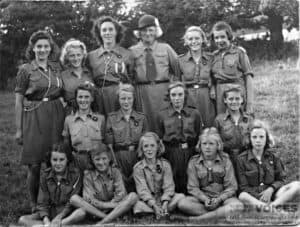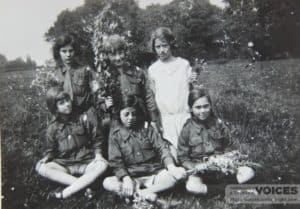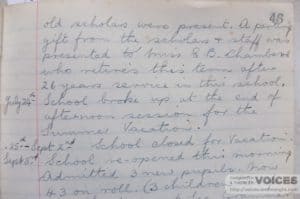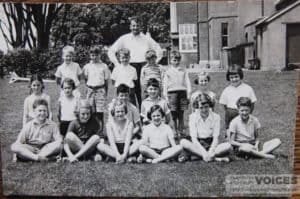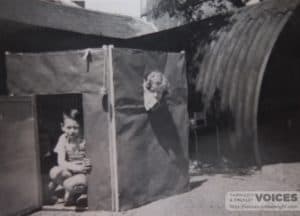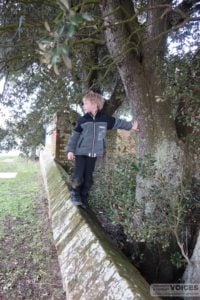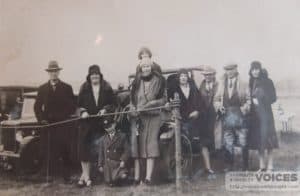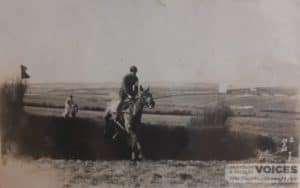One year we had an outing to London and Windsor, all in one day, when I was in the Sea Rangers. Although we were Sea Rangers, we didn’t have much to do with boats.
Mrs Hans Hamilton was the leader.
Effie Pitman b 1921
Category Archives: Uncategorized
Pat Burt: Free Time, Brownies and Guides 1940s
Mrs Hamilton used to take us into Thorley Copse, in the middle there where the paths cross. We used to have fires in there in the copse. It was used by the public then,but it may have been owned by Thorley Manor. We used it all the time rather than Mill Copse. We used to pick primroses; just the flowers, we never took the plants.
We couldn’t go camping during the war so the only Guide camp I went to, was in August 1945. Mrs Hamilton took us camping at St Helens.
Annette’s not in the photo, she dropped out of guides because she started work at 14 so she was probably working. Pat Burt nee Adams b 1929
Eileen Smith: Free Time, Brownies and Guides 1930s
My aunt was one of the original Girl Guides and I joined the Brownies. The year after I joined, we had a coach trip to Wootton to meet up with other Brownie groups. Effie was there too.
On Armistice Day and Empire Day at school, we were allowed to wear our uniform. There was a big British Legion then too, and they used to have an important Armistice Day ceremony. One year I was the flag bearer for the guides, I was so proud.
On summer evenings, we used to go down to Rofford’s Field, and cut out a turf and make a campfire to cook our supper. Oh it was lovely! We used to wade in the marsh, sometimes with the mud right over our wellingtons, and collect moorhen’s eggs to cook. They were like pullets’ eggs, gorgeous. There weren’t coots, only moorhens. Eileen Smith
Nick Chandler: Yarmouth School 1940s
I remember Miss Chambers who lived down by the Mill. If you swore she used to wash your mouth with soap and water. She used to grab hold of you with a cup of soap and water, and put it in your mouth. She kept her handkerchief tucked in her knickers, the old long bloomers. She was a good old gal though. She made sure that what she taught, you knew; taught you to read.
Then there was Mrs Barton, she could be a bit severe at times. I remember once Mick and Barry got the cane , which they didn’t like. Come lunchtime, in the classroom was this fish tank that had tadpoles and stuff in it. What did they do? They both peed in it and killed all the tadpoles, we saw them do it. Nick Chandler b 1937
Pete Smith: Yarmouth School 1950s
Mr Hector was a mixed bag. He was a real scary teacher because he would throw a slipper across the classroom at you. I can see him pick up Roger Sheldon and Nibbo Kellaway by their ears. He was a really strange bloke. But do you know, he was sort of fiery but he had a lot of interesting things to say. If you tuned in to what was going on in the lesson he was fine but soon as you drifted off, well, look out or he’d throw the chalk at you or the blackboard rubber. You had to really watch out for him. You didn’t quite know when he was going to go over the edge.
PeterSmith b 1946
Rod Corbett: Yarmouth School, 1950s
My first day at school didn’t last very long. There was an old Nissen hut in the playground, probably left over from where the Army had had a gun on the refuse tip next door. There was a table in it, so I climbed on with another boy who was starting school with me. I gave him a shove and knocked him off, and he howled – he was always a bit of a ‘boohoo’. Anyway, I thought, ‘I’d better not stay here’, so I ran home to Gran
( my great grandmother who lived in Field Cottages).
Rod Corbett b 1943
Mary Lord: Yarmouth School 1940s
Phil Kelsey: Yarmouth School
Going to school of course was only a quick nip down the road for me, from Mill Terrace. I remember how we used to play football there. On a Monday as soon as one or two got there, two of us would pick a team of what was there, then we’d start and as each one come into the school they went to one team, and the next one went to the other team. It finished up with quite a number of players on each side. In the top half, the old toilet was one goal. Phil Kelsey b 1920
David Biles: Free time, Point-to-Point races at Tapnell
In the 20s and 30s, the Isle of Wight Point-to-Point races, run under Jockey Club Rules were held at Tapnell Farm when Colonel Jennings farmed there. The course had to be over three and a half miles of hunting country, and the horses jumped broad lane as part of the race.
Jack Seely, Baron Mottistone’s, famous horse ‘Warrior,’ which survived active service throughout WWI, was winner in 1921 and 1922.
One year, Harold Biles won on Edamite, a horse he later sold in Southampton for £300 – an enormous price in its day. Edamite went on to take 3rd place in the Foxhunter Race at Cheltenham and was eventually sold for £2000!
Eileen Smith: Free Time 1930s
Horse racing
Before the war, there used to be West Wight Point-to-Point races
on the fields up Broad Lane. On the days it was on, Ralph and the chaps who worked at Mills used to cycle up in the lunch hour to watch, and hope they got back in time for the afternoon!
Eileen Smith nee Lansdowne b 1921


